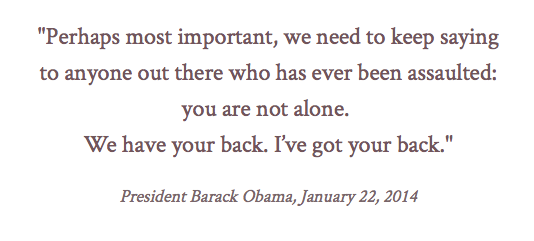I’m telling the story of my sexual assault. My rape.
At the conference I just attended, ACPA 2016, I saw how profoundly impacted the crowd was by a young lady telling the story of her sexual assault. You could tell they were shocked – she didn’t “look” like how they they thought a sexual assault victim should “look.” I heard, “She’s so sweet!” and “She looks just like my best friend!”
I hope to share my story to help bring awareness to an awful reality in our society still today. Not only does sexual assault happen, but the victims often find themselves in situations where people call it a “he said, she said” or a “misunderstanding.” Victims don’t find themselves in those situations, rather people choose to put them there. Those people need to have an awakening about sexual assault. Sexual assault doesn’t “happen” to only “certain” people. It could happen to anyone. It could be done by anyone.
Raise awareness. Support the survivors. Taking the report is not enough. Be compassionate. There are more survivors than you think. One in four college students have been sexually assaulted.
Hearing Kristen talk about her story has given me the strength to publish this draft I wrote some time ago.
After 12 years, I forgave myself. After 12 years, I forgave him. I decided he doesn’t deserve any bit of my attention. He doesn’t get any real estate in my psyche.
For those 12 years, though, I struggled. I struggled with nightmares, while asleep and awake. I struggled with touch: hugs, unexpected brushes of arms, and even the loving touch of my wonderful husband. I struggled with blame, often telling myself how dumb I was putting myself in that situation. I struggled with guilt, often railing myself for how naïve I was.
In hope this will impact even just one person’s view of sexual assault awareness, I post this story. The names have been omitted because I never made the report. I never found the strength.
It was a Saturday morning. My friend needed me to watch his son. He had to work all day. His girlfriend had to work at the bank until noon and would be back after that. I met her at their apartment and she left for work. I settled in playing with [the toddler].
His son had a cold. He fell asleep after I fed him a snack and cleaned up his nose. He was about 2 at the time. His bedroom was straight back from the apartment door. Their bedroom was to the left of the toddler’s bedroom.
After cleaning up the dishes I used to make the toddler’s snack, I sat down on the sofa to watch tv. I was watching Where the Heart Is when he came in the door.
I remember being startled because I didn’t expect him to come home. I then got up and started to gather my things. He asked me if I wanted to see his girlfriend’s birthday present. I said, “Sure.” He said, “It’s in the bedroom.” I said, “Okay,” and followed him into the bedroom.
He said to sit down on the bed while he got it out of the closet. Again I said, “Okay,” and sat down on the foot of the bed. He went to the closet and said for me to close my eyes. I laughed, said, “Okay,” one last time and totally expected him to show me skimpy lingerie and didn’t want the Victoria’s Secret bag to spoil the surprise. Then he handcuffed my wrist, and linked my hands behind me. I asked what he was doing and then said, “Oh! Ha! You got her handcuffs.” (they were into that sort of thing). He said that’s not all. I asked him if he could take the handcuffs off and tried to get my hands out.
He went back to the closet and came back with his hands behind his back. He then quickly put the blindfold over my eyes and shoved me back on the bed. He proceeded to pull my pants and underwear off. I started to panic. I asked him what he was doing. He said, “Showing you [her] birthday present.” As he forcibly penetrated me. I felt a sharp pain. It burned. And it hurt. He asked me if it felt good. I told him it hurt. He said it was supposed to feel good and he didn’t stop.
Afterward, he took off the blindfold and the handcuffs. I can’t remember if he pulled my pants up or if I did. I quickly got my things and left. I got to my car but couldn’t remember how to drive. I remember crying then sobbing. The next thing I remember, I was home. Chris was shocked to see me home early. I didn’t tell him. I couldn’t face the shame.
It was another 10 years before I told him what happened. By not telling him, I hurt him worse than telling him when it happened. He reassured me that it wasn’t my fault.
Days after the assault, [he] tried contacting me . I ignored his phone calls. I ignored his texts. In his messages, he acted like it was no big deal.
A couple of weeks later, I tried calling his girlfriend at her work to tell her what happened, since I didn’t want [him] seeing the call and denying it. She said he told her I would try something like this. He said I wanted to break them up because I wanted to be with him. She screamed at me on the phone. We didn’t talk again.
Years later [he] emailed me at my work email while I worked in the financial aid office at SLU Law. He said he was sorry for anything he had ever done and hoped I was well. I replied curtly that I hoped his family was well. He replied once more implying that I wasn’t over it and could understand why I didn’t want to talk.
Shortly after the email I saw him at Costco. Apparently he works there with their cell phone booth. I approached Costco management about letting me know when he works so I could then shop on times when he is not there. He hesitated. I let the manager know it was in relation to a sexual assault from years prior. The manager then said he couldn’t provide me the information as it violated the employee’s privacy and that he wasn’t sure what sort of disagreement I had with [him], but stands by his employees and can’t get involved with a “he said she said.” The manager then suggested I shop somewhere else.
Society shouldn’t ostracize the victim. Please make sure you don’t. Where is the compassion for the survivor? I hope you find it on your campus and encourage others to find it too.

